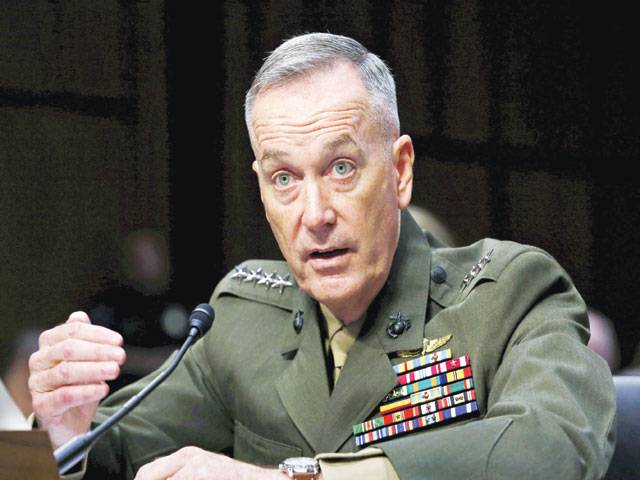WASHINGTON - The nominee for the chairman of US Joint Chiefs of Staff, General Joseph Dunford, called for forging an "enduring partnership" with Pakistan to ensure regional stability as he testified at his confirmation hearing before the Senate Armed Services Committee on Thursday.
"The United States and Pakistan share the common strategic interests of defeating Al-Qaeda and other extremist threats, ensuring regional stability, and furthering the non-proliferation of nuclear weapons and technology," he told lawmakers. "We also share the goal of a stable peaceful Afghanistan."
“We will need to continue cooperation with Pakistan ...," said Gen Dunford, who has been picked to replace Gen Martin Dempsey. "Our assistance has enabled operations against Al-Qaeda and helped secure our strategic interests."
Pakistan, he said, has cooperated with the United States in its operations against Al-Qaeda and other terrorist organisations. "Their actions in North Waziristan and other areas of western Pakistan have disrupted groups that are a threat to US personnel and objectives in Afghanistan," he said, referring to the Zarb-e-Azb military operation.
"If confirmed, I will continue to work with the Pakistani military to ensure that they continue to do more," he told the committee.
He said the key US strategic interests in Pakistan are: Preventing Al-Qaeda’s resurgence in Afghanistan and Pakistan to limit its ability to attack the homeland; Preventing the proliferation of nuclear weapons and technology, and promoting regional stability.
Dunford said that the US and Pakistan have differences on several issues, but asserted that financial and military aid to Islamabad would continue. "Areas of divergent interest with Pakistan include our views on the use of proxies and the importance of a positive and stable Pakistan-India relationship,” he added.
“Pakistan's relationship with Afghanistan had improved since the election of President Ashraf Ghani. The Ground Lines of Communication (GLOCs) were open and Pakistan’s support has been commendable.”
Pakistan, he said, was taking "demonstrable steps" to disrupt the IED (improvised explosive device) network, to include placing new restrictions on the distribution of precursor materials and hosting regional discussions to discuss the IED problem with international partners.
But the main thrust of his two-hour testimony was his claim that Russia’s aggressive behaviour and its nuclear arsenal make it the single greatest national security threat faced by the United States.
He also said that the military could step in if necessary if negotiations on a nuclear deal with Iran fail. Asked whether the military had the ability to destroy Iran’s nuclear programme, General Dunford said, “My understanding is that we do, senator.”
During the hearing, Gen Dunford was peppered with questions that ran the gamut of the issues he would face as chairman: how the United States should handle Iraq and Afghanistan — he has commanded American troops in both countries — how best to manage emerging threats in Asia, what to do about modernising America’s nuclear arsenal and its submarine fleet, and how to combat sexual assault and harassment in the military.
“If you want to talk about a nation that could pose an existential threat to the United States, I’d have to point to Russia,” he said. “And if you look at their behaviour, it’s nothing short of alarming.”
Gen Dunford said it would be reasonable for the United States to provide weapons to Ukraine to help it combat Russian-backed separatists.
“Frankly, without that kind of support, they are not going to be able to defend themselves against Russian aggression,” he said.
On other pressing issues he was more circumspect, especially when it came to the fight against the Islamic State. He generally avoided getting into specifics about how best to help Iraq’s beleaguered military, and the still nascent efforts to train Syrian rebels to fight the insurgents, saying he wanted to get a sense of the situation on the ground before deciding if more needed to be done.
But when pressed on whether Iraqi troops would be more effective if accompanied into the field by American troops — a step that the Obama administration has so far refused to take — Gen Dunford said they would.
For now, though, he said the 3,300 American troops in Iraq were adequate, but with a caveat: “As conditions change on the ground, it may become necessary to adjust how we implement the military campaign.”
Saturday, April 20, 2024
US Gen calls for building 'enduring partnership' with Pakistan

A Tense Neighbourhood
April 19, 2024
Dubai Underwater
April 19, 2024
X Debate Continues
April 19, 2024
Hepatitis Challenge
April 18, 2024
IMF Predictions
April 18, 2024
Kite tragedy
April 19, 2024
Discipline dilemma
April 19, 2024
Urgent plea
April 19, 2024
Justice denied
April 18, 2024
AI dilemmas unveiled
April 18, 2024
ePaper - Nawaiwaqt
Advertisement
Nawaiwaqt Group | Copyright © 2024





